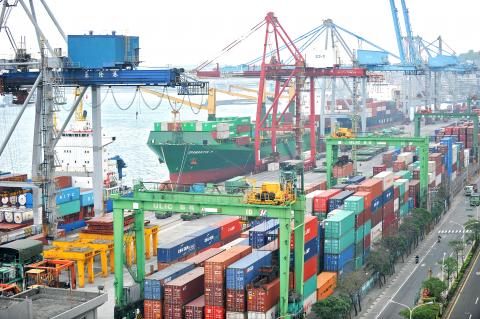Taiwan’s exports rose 21.8 percent from a year earlier to US$24.37 billion last month on demand from China, the US and Europe ahead of Christmas and the Lunar New Year, the Ministry of Finance said yesterday.
It was the third-highest value ever, with exports to Europe increasing 27.8 percent on a yearly basis to a new record of US$2.95 billion despite lingering debt problems there, the report said.
For the first 11 months, exports increased 36.6 percent to US$250.81 billion and are set to exceed the US$272.7 billion level for the whole of this year that the Directorate-General of Budget, Accounting and Statistics (DGBAS) forecast last month, Lin Lee-jen (林麗貞), head of the ministry’s statistics department, said at a news conference.

PHOTO: AFP
“Exports this quarter will outperform the third quarter as demand for consumer electronics remains strong amid the region’s fast-growing economies,” Lin said.
Shipments of electronics gained 16.4 percent yearly to US$6.75 billion last month, while those of base metals and related products increased 25.9 percent to NT$2.27 billion, the report showed.
Imports jumped 33.8 percent year-on-year to US$23.96 billion last month with capital goods contributing US$4.4 billion, suggesting active expansions on the part of the private sector, Lin said.
The latest trade figures translated into a trade surplus of US$410 million, the lowest since the global financial crisis in 2008, due to the import of three aircraft, Lin said, dismissing links with foreign exchange rates.
The New Taiwan dollar weakened NT$0.22 against the US currency last month from October, she said.
Shipments to China including Hong Kong picked up 18.2 percent yearly to US$9.83 billion last month, while exports to the US increased 32.1 percent to US$2.96 billion, the report said.
Exports to Southeast Asian countries gained 15.8 percent to US$3.53 billion last month, while those to Japan grew 12.3 percent to US$1.57 billion, the report said.
The rosy trade data is likely to encourage the central bank to hike interest rates in its quarterly board meeting later this month to cushion inflationary pressure, said Tony Phoo (符銘財), an economist at Standard Chartered Bank Taiwan Ltd (渣打銀行).
“The central bank will likely raise the interest rate by another 12.5 basis points as Taiwan’s real interest rate was in negative territory last month,” Phoo said.
The nation’s consumer price index rose 1.53 percent last month from a year earlier, DGBAS reported on Monday, while the one-year time deposit rate is currently 1.13 percent at Bank of Taiwan (臺灣銀行).
Donna Kwok (郭浩莊), an economist on Greater China at HSBC, however, said the central bank is likely to halt the interest normalization cycle this month with the NT dollar still under appreciation pressure.
“We expect the central bank to keep its policy rate frozen,” Kwok said in a note. “With the formation of new headwinds in Europe and the negative turn in the US labor market, the outlook for Taiwanese exports is gloomier than in September.”

‘SWASTICAR’: Tesla CEO Elon Musk’s close association with Donald Trump has prompted opponents to brand him a ‘Nazi’ and resulted in a dramatic drop in sales Demonstrators descended on Tesla Inc dealerships across the US, and in Europe and Canada on Saturday to protest company chief Elon Musk, who has amassed extraordinary power as a top adviser to US President Donald Trump. Waving signs with messages such as “Musk is stealing our money” and “Reclaim our country,” the protests largely took place peacefully following fiery episodes of vandalism on Tesla vehicles, dealerships and other facilities in recent weeks that US officials have denounced as terrorism. Hundreds rallied on Saturday outside the Tesla dealership in Manhattan. Some blasted Musk, the world’s richest man, while others demanded the shuttering of his

ADVERSARIES: The new list includes 11 entities in China and one in Taiwan, which is a local branch of Chinese cloud computing firm Inspur Group The US added dozens of entities to a trade blacklist on Tuesday, the US Department of Commerce said, in part to disrupt Beijing’s artificial intelligence (AI) and advanced computing capabilities. The action affects 80 entities from countries including China, the United Arab Emirates and Iran, with the commerce department citing their “activities contrary to US national security and foreign policy.” Those added to the “entity list” are restricted from obtaining US items and technologies without government authorization. “We will not allow adversaries to exploit American technology to bolster their own militaries and threaten American lives,” US Secretary of Commerce Howard Lutnick said. The entities

Minister of Finance Chuang Tsui-yun (莊翠雲) yesterday told lawmakers that she “would not speculate,” but a “response plan” has been prepared in case Taiwan is targeted by US President Donald Trump’s reciprocal tariffs, which are to be announced on Wednesday next week. The Trump administration, including US Secretary of the Treasury Scott Bessent, has said that much of the proposed reciprocal tariffs would focus on the 15 countries that have the highest trade surpluses with the US. Bessent has referred to those countries as the “dirty 15,” but has not named them. Last year, Taiwan’s US$73.9 billion trade surplus with the US

Prices of gasoline and diesel products at domestic gas stations are to fall NT$0.2 and NT$0.1 per liter respectively this week, even though international crude oil prices rose last week, CPC Corp, Taiwan (台灣中油) and Formosa Petrochemical Corp (台塑石化) said yesterday. International crude oil prices continued rising last week, as the US Energy Information Administration reported a larger-than-expected drop in US commercial crude oil inventories, CPC said in a statement. Based on the company’s floating oil price formula, the cost of crude oil rose 2.38 percent last week from a week earlier, it said. News that US President Donald Trump plans a “secondary